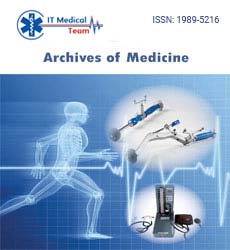Dogan Zeytun*
Department of Internal Medicine, University of Health Sciences, Antalya, Turkey
- *Corresponding Author:
- Dogan Zeytun
Department of Internal Medicine
University of Health Sciences
Antalya, Turkey
E mail: dgzeytun@erincan.edu.tr
Received Date: September 09, 2021; Accepted Date: September 23, 2021; Published Date: September 30, 2021
Citation: Zeytun D (2021) Parkinson’s Disease: Signs, Affect and Management Factors. Arch Med Vol. 13 No. 9: 47.
Perspective
Parkinson's Disease (PD) is a chronic, progressive neurodegenerative disorder characterized by both motor and non-motor features. Parkinson's disease affects an estimated 10 million sufferers worldwide. Parkinson's disease affects predominately dopamine producing neurons in a specific area of the brain called substantia nigra. Parkinson’s disease is a movement illness that disturbs the nervous system. The signs occur because of low dopamine levels in the brain. The symptoms of Parkinson’s disease progress gradually. They often start with a minor tremor in one hand and a sense of stiffness in the body and some people can experience other symptoms like dementia. It occurs when nerve cells in the brain don't produce sufficient of a brain chemical called dopamine. While there is no cure, different treatments have been developed to accomplish the symptoms of Parkinson’s disease. Surgical, pharmacological and therapeutic treatments have allowed physicians to treat not only the main motor symptoms of Parkinson's disease.
Some early signs of parkinson’s disease may include:
- Movement changes, such as tremors
- Coordination and balance impairments that can cause a person to drop things or fall over
- A loss of sense of smell • Gait changes, so a person leans forward slightly or shuffles when walking
- Fixed facial expressions due to changes in the nerves that control face muscles
- A voice tremor or softer voice
- More cramped and smaller handwriting
- Sleep problems resulting from restless legs and other factors
- Rapid eye movement sleep disorder may be a powerful predictor, according to a 2015 study
There are two forms of Parkinson's disease, familial; genetically inherited in either an autosomal dominant or recessive manner while the etiology of Parkinson's disease is still largely unknown, the condition is likely to be multifactorial with genetic and environmental factors contributing to disease genesis. The combined effect of genetic and environmental factors may influence the onset of human disease by structurally altering Deoxyribonucleic Acid (DNA). For example, caffeine is an adenosine receptor antagonist which increases dopamine neurotransmission and found to reduce the risk of Parkinson's disease. Pesticides and heavy metals display a negative effect and increase PD by causing gene variations linked to familial Parkinson's disease resulting in Parkinson's disease-associated mechanisms such as mitochondrial dysfunction, oxidative stress and protein degradation impairment.
Demographic factors including age, gender and culture may also affect Parkinson's disease susceptibility. Age is a major risk factor for Parkinson's disease. Not only has the prevalence of Parkinson's disease been observed with increasing age, Most cases develop between the ages of 60-65 years. Parkinson's disease amongst men is higher than women. Estrogen may act as a neuro-protective agent and women who have had a high lifetime contact from such things as lengthy fertility windows and numerous births show a reduced risk of developing Parkinson's disease.
Drug-Induced Parkinsonism (DIP) should be considered in the variance diagnosis of Parkinson's disease because it is one of the few alterable causes of the syndrome. High-risk populations for DIP contain elderly women, patients with numerous comorbidities, and patients taking several medications at high doses for prolonged periods. The drugs most commonly associated with Drug-induced Parkinsonism include those with dopamine receptor–blocking properties, such as the antipsychotic agent’s thiothixene, risperidone and haloperidol. An early diagnosis is the presence of non-motor comorbidities, including depression, 2021 Vol.13 No.9:47 2 This article is available from: http://www.archivesofmedicine.com/ Archives of Medicine ISSN 1989-5216 anxiety, fatigue, constipation, anosmia, and sleep disorders. Once the diagnosis of PD has been confirmed, patients who receive appropriate treatment may have a life expectancy similar to that of unaffected individuals. There are no specific tests to confirm a diagnosis of Parkinson's disease.
It is unlikely to inhibit Parkinson’s disease, but some lifelong habits may help decrease the risk.
- Avoiding toxins
- Avoid head trauma Regular physical exercise
- Dietary factors
Parkinson’s disease is a lifelong condition connecting neurological changes in the body. Specialists do not know why Parkinson’s disease occurs, but hereditary and environmental factors may play a role. Specifically, professionals have found strong links with past traumatic brain injury and exposure to toxins. Regular physical exercise, a healthy diet, and avoiding toxins may all help prevent Parkinson’s disease, but there is no current evidence to confirm the specific cause.
40187






